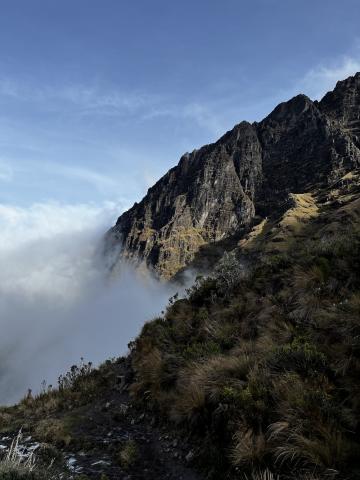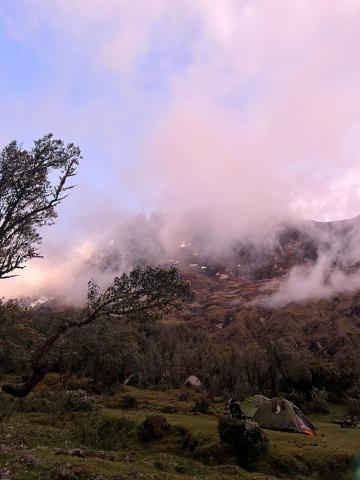
I have noticed that Ecuadorians love to be tourists in their own country. Foreign tourism exists but isn’t a massive industry here, so when you visit a town known for its tourism, I estimate that it’s 90% Ecuadorians, 10% international travelers. It makes exploring Ecuador feel particularly special – being surrounded by the tangible love and appreciation even the locals have for their home country.
Image
Despite having lived in Oregon for about ten years now, I have never been much of an outdoorswoman. That said, I try not to take the natural beauty Oregon offers for granted. For example, I love hot springs and skiing. It’s more that my idea of a fun Saturday isn’t hiking, and I go camping just about annually. Before my time in Ecuador, I had certainly never been on a backpacking trip. But here I am in Ecuador, a small country known predominantly for its intense biodiversity and profound accessibility to nature. It would be a true waste of my time here not to take advantage of every backpacking trip, every weekend in the jungle, and every mountain summit. Ecuador has taught me to intensely love and cherish the great outdoors, far more than I previously had.
One of the most unique and extraordinary experiences I’ve had was spending two weekends exploring the Amazon jungle. The first weekend was cultural. I visited a remote indigenous village of the Waorani tribe called Gomataon, located a few hours by canoe from the city of Tena along the Rio Nushino. We spent the weekend learning about their homeland, traditions, and daily life. I learned to prepare yuca and how to shoot a blow pipe, a weapon used in the traditional hunt of monkeys. They taught us about how different native plants have multitudes of uses, from bag weaving to natural shampoos. The insects in the Amazon are totally super-sized. I was totally mesmerized, if not a bit creeped out by them. One evening I had quite the jump scare from a cricket the size of my foot relaxing outside my cabin door.
Image
The community maintains a delicate balance between incorporating Western styles of education and technology while continuing indigenous education, knowledge, and way of life. I learned that my host university, USFQ, uses part of Waorani tribe land for the Tiputini Research Station deep in the Yasuni national forest. Because of their use of this land, students who are members of the Waorani tribe can attend the University on scholarship. The following jungle weekend was environmental, as opposed to cultural. I was able to visit the Tiputini Research Station, which is located even deeper in the Amazon jungle. There we witnessed incredible plant and insect biodiversity, as well as tons of animals, including capybara, many birds, pink river dolphins, a few varieties of monkeys, caimans, piranhas, otters, iguanas, and even spotted a jaguar! I was particularly captivated by the monkeys we saw swinging in the canopy and the swarms of large vibrant butterflies that collected along the shore of Rio Tiputini.
By Lena Wehn, Diverse Ducks Ambassador
Universidad San Francisco de Quito Exchange, Fall 2023
